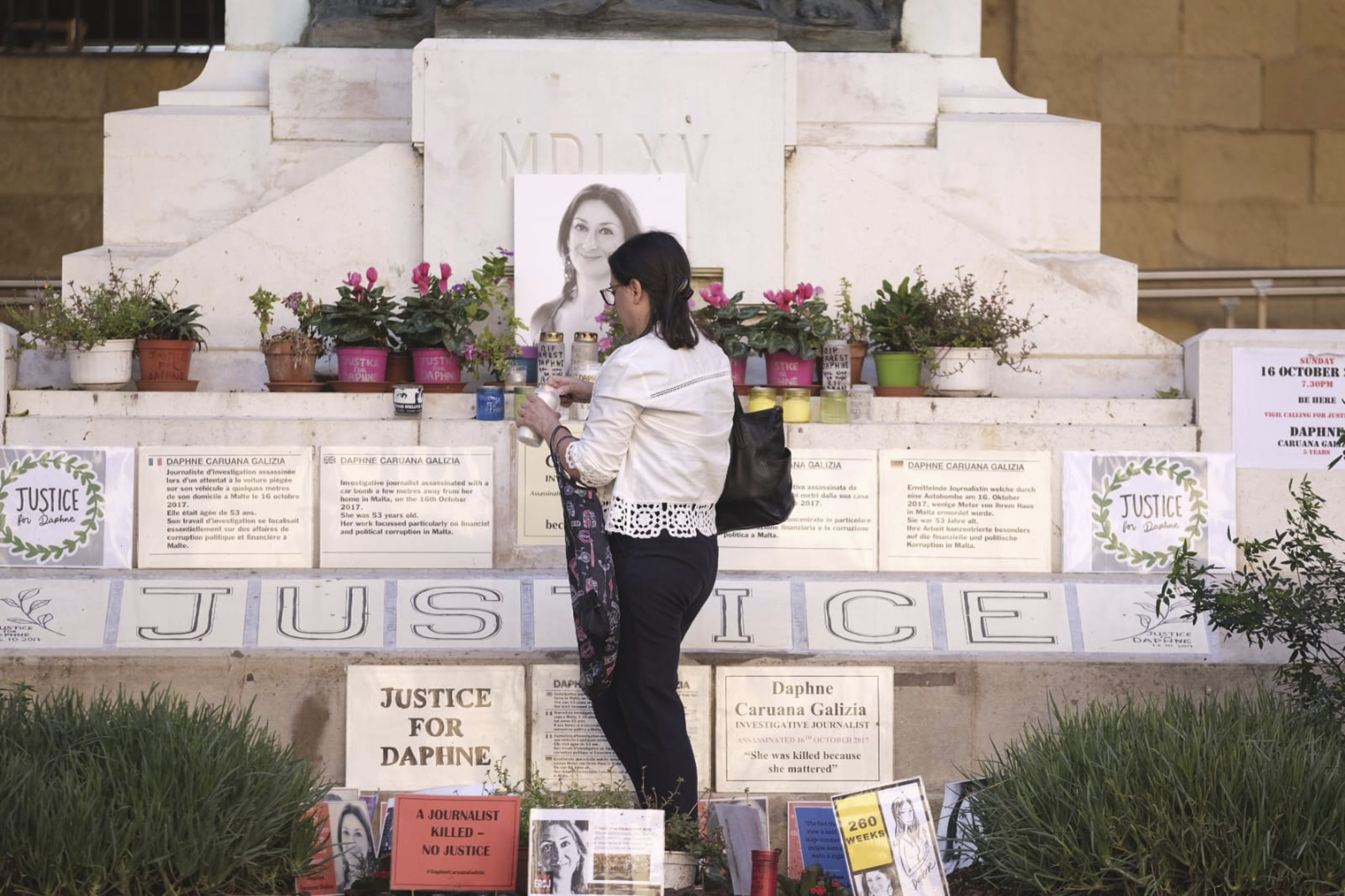 1
1 1
1
VALLETTA, Malta (AP) — Malta on Sunday marked the fifth anniversary of the car bomb slaying of investigative journalist Daphne Caruana Galizia with calls for justice, just two days after two key suspects reversed course and pleaded guilty to murder on the first day of their trial.
Caruana Galizia’s relatives, Maltese activists and the Maltese president of the European Parliament gathered at the site of the bombing on the small Mediterranean island nation to lay flowers and later took part in a nighttime march in the capital. They were joined by the sister of Italy’s crusading anti-Mafia investigator, Giovanni Falcone, who was himself assassinated by the mob in a highway bombing in Sicily in 1992.
Caruana Galizia, who had written extensively about suspected corruption in political and business circles in the EU nation, was killed Oct. 16, 2017, when a bomb placed under her car detonated as she was driving near her home. The murder shocked Europe and triggered angry protests in Malta.
A 2021 public inquiry report found that the Maltese state “has to bear responsibility” for the murder because of the culture of impunity that emanated from the highest levels of government. But as recently as last month, the Council of Europe’s commissioner for human rights had decried the “lack of effective results in establishing accountability.”
When the trial opened Friday for brothers George Degiorgio, 59, and Alfred Degiorgio, 57, the alleged hitmen reversed their pleas and pled guilty to carrying out the murder and were sentenced to 40 years in prison apiece. The sentencing brought to three the number of people serving time, after Vincent Muscat pleaded guilty last year for his part in the murder and was sentenced to 15 years in prison.
Maltese Archbishop Charles Scicluna opened Sunday’s anniversary commemoration by celebrating a Mass at Bidjna church near where Caruana Galizia lived, saying killing can never be “business as usual” and stressing the need for justice, even when it makes the powerful uncomfortable.
“The question we have to answer, before complaining to God, is: are we doing our part,” Scicluna told the faithful. “Or is our silence, our complicity, our fear, preventing God from bringing justice?”
The government and opposition both welcomed Friday’s sentencing as a step forward, but said full justice still needed to be delivered — a call echoed repeatedly during Sunday’s events.
“Daphne still cannot write her blog, enjoy her children and grandchildren, potter in her garden or be with her loved ones,” European Parliament President Roberta Metsola wrote on social media ahead of the anniversary. “Today is not justice, it is a small step. Now for those who ordered and paid for it, those who protected them and those who spent years doing everything imaginable to try to cover it up.”
Caruana Galizia, 53, was a top Maltese investigative journalist who had targeted people in then-Prime Minister Joseph Muscat’s inner circle whom she accused of having offshore companies in tax havens disclosed in the Panama Papers leak. She also targeted the opposition. When she was killed, she was facing more than 40 libel suits.
There are other cases currently under way in Maltese courts relating to the murder.
Yorgen Fenech, a top businessman with ties to the former government, is awaiting trial following his 2021 indictment for alleged complicity in the slaying and for conspiracy to commit murder. His arrest in 2019 sparked a series of mass protests in the country that culminated with Muscat’s resignation.
Fenech had entered not-guilty pleas to all charges in the pre-trial compilation of evidence. Two other men have been accused of supplying the bomb and are currently undergoing a pre-trial compilation of evidence. They have pleaded not guilty.
A self-confessed middleman, taxi driver Melvin Theuma, was granted a presidential pardon in 2019 in exchange for testimony.
After the Mass, Sunday’s daylong commemoration also included a silent gathering at the site of the bombing attended by Caruana’s family members, Metsola and civil society activists. They planted a banner reading “Justice” in the ground alongside a big poster of the journalist’s face and lay flowers in the shape of the number five. They were joined by Maria Falcone, whose brother Giovanni, his wife and three bodyguards were killed by a bomb planted on a Sicilian highway on May 23, 1992.
Becky D’Ugo, an activist with Repubblika civil society movement, read excerpts of Caruana Galizia’s articles at the site that referred to Malta being in a “terrible mess.”
“’Crisis does not begin to describe it,’” she read at the bombing site. “‘Put simply, if Muscat and his henchmen survived this, Malta will not.’”
Later Sunday, demonstrators including Metsola and family members gathered outside Malta’s parliament and marched, chanting “Justice” and “Daphne was right,” to the square in front of the law courts where a monument has been turned into a makeshift memorial honoring the journalist.
___
This story has been corrected to show that the quote in the penultimate paragraph was from the writing of Caruana Galizia, not a quote from the activist.